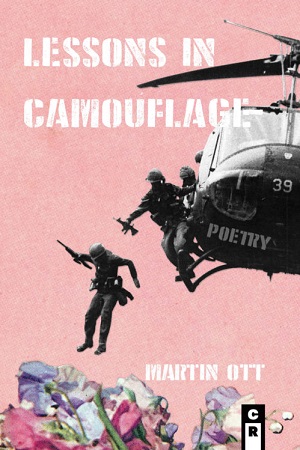 Lessons in Camouflage, by Martin Ott
Lessons in Camouflage, by Martin Ott
Review by John Venegas
I find it difficult to fully conceptualize the extent to which patriarchy has inundated and insinuated itself into our society. That is by no means to say that such an infestation has not occurred – the only reasons to deny the copious evidence are ignorance or dishonesty – but comprehension of the sheer scale of the problem is frightening and difficult. The tasks before those of us who care about the well-being of our people, our country, and our species is a daunting one, both inherited and entrusted to us by those of our predecessors who recognized the Beast for what it is and who knew the price to be paid for challenging its strength. The most important of those tasks, obviously, is the empowerment of those who the system would otherwise parasitically feast upon. But there is another task, the completion of which which is vitally important if real and lasting change is to be effected: helping men to understand the repercussive, masochistic damage wrought upon them by patriarchy. To be clear, the primary victims of patriarchy are and always have been women, trans and intersex people, and all others who find their place on the spectrum of gender or beyond it. But men must come to terms with the fact that, from birth, they take part in a system that abuses them as both slave and guardian. And to this effort, I find wellsprings of hope when I encounter art such as Lessons in Camouflage. This poetry collection, written by Martin Ott, is a beautiful, haunting, and resonant example of what can happen when the veil is lifted from a man’s eyes.
Look into ash. I’m there where you begin.
I am the shadow that forms in front and stays
long after you’ve lost the spark within.
My power plumes in endless praise.
The collection begins with the lines “Yesterday’s sky is my molting skin. / My soldier’s makeup stains the plays / on a global stage, the actors dead, maudlin / applause sweeping across your family’s strays.” I really cannot think of a better thesis statement in the text. From the start, Lessons is telling you what it is, what it intends to do, and how it’s speaker regards his responsibilities. We often romanticize understanding or truth as some pathway to happiness or reward, and yet this could not be further from reality. Understanding and truth often carry terrible weight, weight we might rather flee from or transfer to someone else. In these opening lines, the speaker’s apotheosis is one of blood, the beginning of comprehension with regards to culpability and ramifications. In the direct sense, it is admission of guilt, of regret for having participated in the inflicting of pain and the ending of lives. The speaker is one amongst the ravenous mob whose morality has forced him to find a small glimpse of the scope of what the mob has done and might yet do. The language here is brutally effective, mincing no words in its statement of purpose, and it serves as a microcosm of what to expect from the rest of the text. While there is no shortage of clever turns of phrase or intensely compelling imagery, the language moves with an intimidating efficiency, not allowing you to miss the forest for the trees.
Life is not a hook to be baited.
Desire: to let mistakes be. Human.
The sheer range of topics here are a testament to the pervasiveness of patriarchy that I mentioned at the open. The relationships between fathers and sons are dissected and pinned open like frogs as the speaker examines the paternal figures in his life and fights desperately to provide both strength and empowering affection to his own son. Sexual and romantic relationships are explored for their power dynamics and how the treatment of male vulnerability is fundamentally linked toward love and connection. The American hypocrisy concerning violence as a noble, inherently validating, and masculine pursuit and as a perpetual, mindless savagery exhibited by the other exists throughout the text, at times in the form of echoing subtext and at times explicitly laid out in its disfigurement. This in turn ties in intricately to how the collection addresses the treatment of the American solider, and how that concept encompasses everything from fanatical hero-worship to genuine respect and empathy to complete ostracizing and abandonment. Again and again, a series of questions rear their heads: why am I like this, how far does this go, and what can I do about it? This introspection and broadening of perspective is quietly reflected in the construction of the poems themselves. Like the use of language, the use of structure here never strives for ostentation or complexity for its own sake. Rather, the poems are arranged with precision and consistent internal routine, as if the speaker is reacting to these problems with regimented and adaptive discipline.
I played army with the box of men kept
alive in the attic, soldiers in battles
with cowboys and dinosaurs,
an alien armada waiting, a man waiting.
The other major through-line on display in Lessons is one that declares itself right in the title: camouflage. There is, of course, the concept of how camouflage is related to soldiers, both a tool of protection and of increasing the effectiveness of violence. But critically the collection turns around and addresses its audience as well, imploring them to resist hypocrisy and examine how thoroughly camouflaged their own lives are. Advertisers camouflaging exploitation. Moral righteousness camouflaging fear and hate. Masculinity camouflaging repressed vulnerability and empathy. Heroism camouflaging bloodlust. Charity camouflaging selfishness. The collection ends with the lines “I hide my strengths and weaknesses, / clever boy, but my children expose / them with their own. Each day a scab / is torn and each night a new me forms.” If the opening is a clear declaration of intent, then the ending is a clear declaration of potential. The speaker knows he has, perhaps irrevocably, been distorted by the greed and anger of others. He knows that the mechanisms he uses to survive have consequences. But he also understands that awareness of those ideas empowers him to do something about them. He understands that awareness gives him an opportunity to break the cycle. Maybe his children do not need wear camouflage and, rather than transferring the burden of the problem, he can add his strength to theirs.
My son has a nightlight and I remember how
the invisible monsters kept me in their thrall,
the attempt to burn away shadows from sin.
Lessons in Camouflage is an exceptional little book. It challenges deeply ingrained norms while respecting its audience as a group capable of confronting difficulty. It is a collection that is poignant and timely; given the unfortunate reality that many men show intense adverse reactions to any perspective that they do not believe they can identify with, I cannot help but think that maybe a book written by a male Army veteran might stand a slightly increased chance of cracking their walls of ignorance.
Lessons in Camouflage is available now through C&R Press.



